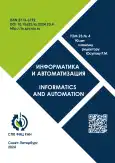A Method for Recognition of Sentiment and Emotions in Russian Speech Transcripts Using Machine Translation
- 作者: Dvoynikova A.A1, Kagirov I.A1, Karpov A.A1
-
隶属关系:
- St. Petersburg Federal Research Center of the Russian Academy of Sciences (SPC RAS)
- 期: 卷 23, 编号 4 (2024)
- 页面: 1173-1198
- 栏目: Artificial intelligence, knowledge and data engineering
- URL: https://journal-vniispk.ru/2713-3192/article/view/265769
- DOI: https://doi.org/10.15622/ia.23.4.9
- ID: 265769
如何引用文章
全文:
详细
作者简介
A. Dvoynikova
St. Petersburg Federal Research Center of the Russian Academy of Sciences (SPC RAS)
Email: dvoynikova.a@iias.spb.su
14-th Line V.O. 39
I. Kagirov
St. Petersburg Federal Research Center of the Russian Academy of Sciences (SPC RAS)
Email: kagirov@iias.spb.su
14-th Line V.O. 39
A. Karpov
St. Petersburg Federal Research Center of the Russian Academy of Sciences (SPC RAS)
Email: karpov@iias.spb.su
14-th Line V.O. 39
参考
- Николаев И.С., Митренина О.В., Ландо Т.М. Прикладная и компьютерная лингвистика // М.:ЛЕНАНД. 2017. 320 с.
- Carosia A.E.O., Coelho G.P., Silva A.E.A. Analyzing the Brazilian financial market through portuguese sentiment analysis in social media // Applied Artificial Intelligence. 2020. vol. 34. no. 1. pp. 1–19.
- Smetanin S. The applications of sentiment analysis for Russian language texts: Current challenges and future perspectives // IEEE Access. 2020. vol. 8. pp. 110693–110719. doi: 10.1109/ACCESS.2020.3002215.
- Карпов А.А., Юсупов Р.М. Многомодальные интерфейсы человеко-машинного взаимодействия // Вестник Российской академии наук. 2018. Т. 88. № 2. С. 146–155.
- Dvoynikova A., Verkholyak O., Karpov A. Analytical review of methods for identifying emotions in text data // CEUR-WS. 2020. vol. 2552. pp. 8–21.
- Ekman P. An Argument for Basic Emotions // Cognition and Emotion. 1992. vol. 6(3-4). pp. 169–200.
- Dvoynikova A., Karpov A. Bimodal sentiment and emotion classification with multi-head attention fusion of acoustic and linguistic information // Computational Linguistics and Intellectual Technologies. 2023. vol. 22. pp. 51–61.
- Viksna R., Jekabsons G. Sentiment analysis in Latvian and Russian: A survey // Applied Computer Systems. 2018. vol. 23. no. 1. pp. 45–51.
- Loukachevitch N., Levchik A. Creating a general Russian sentiment lexicon // Proceedings of the Tenth International Conference on Language Resources and Evaluation (LREC'16). 2016. pp. 1171–1176.
- Demirtas E., Pechenizkiy M. Cross-lingual polarity detection with machine translation // Proceedings of the Second International Workshop on Issues of Sentiment Discovery and Opinion Mining. 2013. pp. 1–8.
- Reichel J., Benko Ľ. The Influence of a Machine Translation System on Sentiment Levels // RASLAN 2022 Recent Advances in Slavonic Natural Language Processing. 2022. pp. 201–208.
- Zygadlo A., Kozlowski M., Janicki A. Text-Based emotion recognition in English and Polish for therapeutic chatbot // Applied Sciences. 2021. vol. 11(21). no. 10146.
- Nandwani P., Verma R. A review on sentiment analysis and emotion detection from text // Social Network Analysis and Mining. 2021. vol. 11(1). no. 81.
- Hartung K., Herygers A., Kurlekar S.V., Zakaria K., Volkan T., Gröttrup S., Georges M. Measuring Sentiment Bias in Machine Translation // International Conference on Text, Speech, and Dialogue. 2023. pp. 82–93.
- Двойникова А.А. Сентимент-анализ транскрипции разговорной речи при помощи автоматического машинного перевода // Сборник трудов IX Конгресса молодых ученых. 2021. C. 199–203.
- Perepelkina O., Kazimirova E., Konstantinova M. RAMAS: Russian Multimodal Corpus of Dyadic Interaction for studying emotion recognition // PeerJ Preprints. 2018. vol. 6. no. e26688v1.
- Russell J.A. A circumplex model of affect // Journal of personality and social psychology. 1980. vol. 39. no. 6. pp. 1161–1178.
- Плунгян В.А. Введение в грамматическую семантику: Грамматические значения и грамматические системы языков мира // М.: РГГУ. 2011. 672 c.
- Goddard C., Wierzbicka A. Semantic and Lexical Universals // Studies in Second Language Acquisition, 1996. vol. 18(4). 520 p.
- Котельников Е.В., Разова Е.В., Котельникова А.В., Вычегжанин С.В. Современные словари оценочной лексики для анализа мнений на русском и английском языках (аналитический обзор) // Научно-техническая информация. Серия. 2020. Т. 2. С. 16–33.
- Hercig T., Brychcín T., Svoboda L., Konkol M. Uwb at semeval-2016 task 5: Aspect based sentiment analysis // Proceedings of the 10th international workshop on semantic evaluation (SemEval-2016). 2016. pp. 342–349.
- Koltsova O.Y., Alexeeva S., Kolcov S. An opinion word lexicon and a training dataset for Russian sentiment analysis of social media // Computational Linguistics and Intellectual Technologies. 2016. vol. 15. pp. 277–287.
- Strapparava C., Valitutti A. Wordnet affect: an affective extension of wordnet // Proceedings of the Fourth International Conference on Language Resources and Evaluation (LREC). 2004. pp. 1083–1086.
- Mohammad S.M., Turney D.P. Crowdsourcing a word-emotion association lexicon // Computational Intelligence. 2013. vol. 29(3). pp. 436–465.
- Hu M., Liu B. Mining and summarizing customer reviews // Proceedings of the tenth ACM SIGKDD international conference on Knowledge discovery and data mining. 2004. pp. 168–177.
- Hutto C., Gilbert E. Vader: A parsimonious rule-based model for sentiment analysis of social media text // Proceedings of the international AAAI conference on web and social media. 2014. vol. 8. no. 1. pp. 216–225.
补充文件









